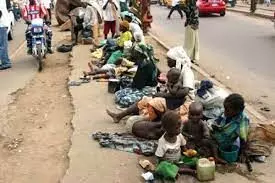- Home
- /
- Business/Economy
- /
- Kaduna, Katsina, Kano...
Kaduna, Katsina, Kano residents lament surge in street begging

Some residents of Kaduna, Kano and Katsina have expressed concern over the increase in the number of street beggars in urban centres in the states.
A cross-section of the residents, who spoke in separate interviews with the newsmen in Kaduna, Kano and Katsina, said the trend was threatening social security and public health in the affected cities
They also decried the high influx of people from rural areas to urban centres and called for collaborative efforts to address the menace.
Begging for alms or charity is an age-long phenomenon in many societies across the globe; however, the multitude of beggars on the streets in parts of the country has been a source of concern to the authorities and members of the public.
The correspondent checks in Kaduna, Kano, and Katsina showed that government offices, banks, eateries, markets, shopping malls, road intersections, and traffic lights are being besieged by desperate beggars, causing nuisance to unsuspecting members of the public.
Some of the street beggars, comprising children, females, and male adults, are asking for money from people, while others scavenge for left-over food, especially at eatery centres.
One of the baggers, Ms. Fati Isa, said that she joined the street begging to enable her to fend for her children.
Isa, a displaced person and mother of three, said her family lost their property to the bandits’ attack, adding that “we lost our belongings and livelihood; it is difficult to feed ourselves.”
Sunusi Abubakar, a 67-year-old resident of Hotoro quarters in Kano metropolis, said he resorted to street begging after he lost his business capital to enable him to fend for his family needs.
He said that he used the proceed from begging to feed his two wives and 13 children.
“I normally go to begging with two of my grandchild while my wives beg in other areas.
“I earn about N2,000 on good days like Fridays and Mondays,” he said.
Rakiya Ishaku and Baba Kande joined thousands of beggars who roamed the streets in Kano metropolis.
The duo claimed to have escaped bandits’ attacks on their villages in Kankara and Shema Local Government Areas of Katsina State.
Kande said she was forced into street begging as she has no one or job to support her.
Commenting, some experts attributed the trend to poverty, rising costs of living, and insecurity, which displaced thousands of people in the North-East and North-West regions.
They argued that street begging negatively impacts education, health, and child protection, as well as the social and economic development of the states.
Mr. Muhammad Ali, a Kaduna-based social analyst, said that poverty, economic hardship, and insecurity were largely responsible for the increase in the number of beggars in urban centres across the region.
“It is unfortunate that most women and children who beg are not IDPs; they have parents in the town but cannot afford to feed themselves.
“The current economic hardship is increasing the rate of poverty in the society. That’s why women and children took to street begging.
“It also led to high number of out-of-School children, which is a serious social problem,” he said.
He urged the government at all level to adopt proactive measures to end poverty and enhance food security.
Mrs. Kafayat Ayomide, an eatery operator in Kaduna, expressed worry over the high number of beggars frequently besieging her shop daily, lamenting that their presence disrupted her trading activities.
She called for sound measures to control inflation and empower the people to address the street begging menace.
“Prices of food items and essential commodities are increasing daily, thereby reducing the purchasing power of the people, and depleting the capital base of businesses,” she said.
On his part, an Islamic cleric, Malam Abubakar Aliyu, said that Islam discouraged begging, adding that people might seek for assistance but they should not take begging as a means of livelihood.
Supreme News also recalls that Gov. Abba Yusuf of Kano State has released N260 million for disbursement to 5,200 women under the second phase of the youth and women empowerment programme.
Yusuf said that each of the beneficiaries would receive N50,000, to enable them to set up their businesses, adding that the gesture would cushion the effect of economic hardship being experienced by the people.
He said that his administration planned to disburse N260 million monthly, to women and the vulnerable to reduce poverty in the state.



